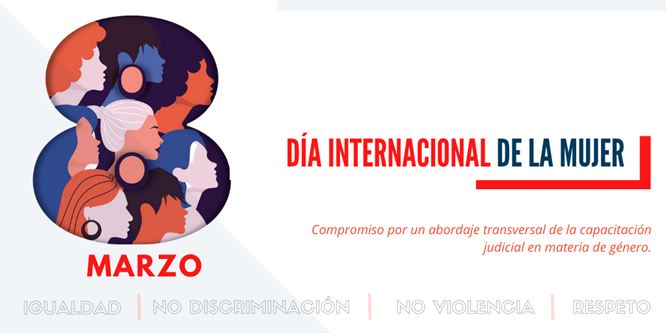International Women’s Day, which is commemorated every 8 March, is a day on which not only to reflect but also to reaffirm commitments that guarantee respect for gender-based equality and non-discrimination.

The Chilean Judicial Academy is aware of its role in these matters and the importance of raising awareness within the judicial context. Indeed, in 2019 the Academy approved a Equality and Non-Discrimination on the Grounds of Gender Plan, which has made it possible to work on and implement a series of actions aimed at fulfilling one of its strategic institutional objectives, which is to “mainstream the perspective relating to gender equality and non-discrimination in all the training activities designed, defined and executed by the Judicial Academy”.
Mainstreaming the principles relating to equality, non-discrimination and gender has led the Academy, in coordination with other actors, to design action strategies that make this conscious and permanent reflection possible.
With the firm intention of following up on this line of work, a technical consultancy has been launched with the European Union EUROsociAL+ Programme, entitled TA Implementation of the Judicial Academy Gender Plan.
Among the activities carried out throughout January and February, it is worth highlighting the virtual exchange with the Judicial School in Spain (General Council of the Judiciary), and the Judicial Training Institute of the Argentine Provinces and the Autonomous City of Buenos Aires (REFLECT/JUFEJUS). On both occasions, experiences were exchanged on gender mainstreaming in educational activities, and best practices were collected for progress in matters relating to equality. For March, the virtual exchange agenda is being developed with the French Ecole Nationale de la Magistrature and the Rodrigo Lara Bonilla Judicial School in Colombia.
It should be noted that the EUROsociAL+ Programme is in the third stage of long-term work in the field of public policies to improve social cohesion in and between Europe and Latin America. Specifically, the EUROsociAL+ Programme builds on the achievements of previous phases through a clear results-oriented approach. Actions are currently being carried out with the national governments of 19 countries in Latin America (and with regional networks). Thus allowing new avenues of mutual learning to be explored and strong inter-institutional relationships and networks to be built.



